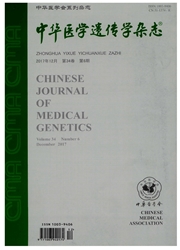

 中文摘要:
中文摘要:
目的应用双生子法探讨遗传和环境因素对儿童青少年智力影响。方法采用中国修订版韦氏儿童智力量表评定6~16岁333对双生子的智力特点。应用结构方程模型分析遗传和环境因素对智力的影响。结果6~16岁儿童青少年的总智商(intelligence quotient,IQ)遗传度为0.43,其中言语智商(verbal intelligence quotient,VIQ)遗传度为0.37,而遗传因素对操作智商(performance intelligence quotient,PIQ)影响甚小。10~16岁的青少年智力遗传度大于6~9岁的儿童(IQ:0.82VS0.00,VIQ:0.80vs0.00,PIQ:0.51VS0.00)。男性的言语智商(0.47)受遗传影响大于女性(0.05);而在男性和女性中,操作智商均主要受共享环境的影响。结论在儿童青少年时期,总智商和言语智商有中度的遗传度,而共享环境因素对操作智商的影响更大;但智商总分及言语智商和操作智商分测试分在年龄较大的青少年的遗传度都明显高于年龄较小的儿童。
 英文摘要:
英文摘要:
Objective To explore the effects of the genetic and environmental factors on intelligence of children and adolescent from the Southwest China Prospective Twin Registry (SCPT). Methods The intelligence was investigated by using the Wechsler Intelligence Scale for Children(C-WISC)in 333 twin pairs aged 6-16 years. The effects of genetic and environmental factors on IQ were analyzed by using structural equation modeling (SEM) and correlation analysis method. The effects in different sex and age groups in this population were also investigated. Results Genetic influence accounted for 0.43 of total IQ variance and 0.37 of verbal IQ in 6-16 years old children and adolescent, but there was no significant genetic effect on performance IQ. The heritability of children aged 10-16 years was higher than that of those aged 6-10 years (total IQ: 0.82 vs 0.00, verbalIQ: 0.80 vs0.00,performanceIQ:0.51 vs0.00). In males the heritability of verbal IQ (0.47) was higher than that in females (0.05). The shared environmental influences accounted for the majority of variance of performance IQ in both males and females. Conclusion There is moderate heritability on the total IQ and verbal IQ, while shared environmental factors played important roles on the variance of performance IQ. The heritability of IQ, verbal IQ and performance IQ are higher in older children and adolescent than that in younger children.
 同期刊论文项目
同期刊论文项目
 同项目期刊论文
同项目期刊论文
 期刊信息
期刊信息
